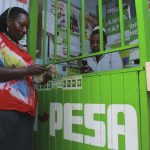In the bustling heart of East Africa, Sistema.bio has emerged as a catalyst for a sustainable agricultural revolution, transcending traditional boundaries and addressing the intertwined challenges faced by smallholder farmers.
Since its inception in Kenya in 2017, Sistema.bio has rapidly expanded its footprint across Uganda, Malawi, Zimbabwe, and Ethiopia, leaving a trail of transformed lives and agricultural landscapes.
In the quest to alleviate poverty, enhance food security, and combat climate change, Sistema.bio introduces innovative biodigesters that convert organic waste into clean energy and powerful bio fertiliser. These biodigesters, simple yet powerful, shield farmers from the escalating costs of conventional fuels.
Sistema.bio has empowered over 10,000 smallholder farmers across East Africa, becoming a catalyst for change.
Farmers not only produce their own biogas but also embrace sustainable, cost-effective organic farming practices. The impact extends to mitigating over 160,000 tonnes of CO2, producing an annual biogas volume exceeding 36 million m³, and positively affecting the lives of more than 60,000 people.
Affordability and accessibility: Biogas for every farmer
Sistema.bio ensures accessibility with plans starting at just Ksh3,000 ($18.69) per month, providing a full-service package encompassing financing, guarantee, installation, and training in local languages. The company’s commitment goes beyond technology, profoundly impacting women who constitute over 75 percent of end-users, addressing economic and health challenges in agricultural activities.
As Sistema.bio pioneers innovative solutions, the company aims to reduce 1 percent of global greenhouse gas emissions by 2030, leaving an indelible mark on the environment and the lives of smallholder farmers.
The AgriFoSe 2030 project
Traditional leafy vegetables, native to Africa, play a crucial role in local diets due to their good response to inputs, adaptability, and richness in vitamins and minerals. An AgriFoSe2030 project, funded by the Swedish International Development Cooperation Agency (Sida), identifies these vegetables as pivotal for improving food and nutrition security, as well as providing income to smallholder farmers in Nakuru and Kisumu Counties, Kenya.
Recognizing a lack of knowledge on production, management, harvesting, preparation, and cooking of traditional leafy vegetables, stakeholders collaborated to develop a training manual.

Stakeholders in Nakuru County, Kenya reading the Afrifosec training manual after it was unveiled on June 2, 2023. PHOTO | COURTESY
The manual, co-produced with county agricultural extension officers, addresses gaps through simple language and pictorials. This initiative, partially supported by the Food and Agriculture Organisation (Fao), enhances ownership and utilization of the manual.
The co-produced manual serves as a tool for agricultural extension workers, farmers, traders, and consumers. With a focus on improved production practices, food safety, and cooking methods, the manual aims to enhance the productivity of traditional leafy vegetables. Given their high nutrition profiles, these vegetables have the potential to address nutritional challenges, such as Vitamin A and iron deficiencies, prevalent in Kenya and Sub-Saharan Africa.
Traditional leafy vegetables, cultivated in small parcels of land, including urban areas, offer a high return per unit area. With a potential to combat under-nutrition, address deficiencies, and support immune system health, these vegetables contribute to a sustainable and nutritious urban food system.



